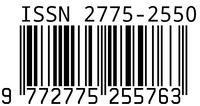Transformation of Muhammadiyah's Da'wah: The Effectiveness of Digitalization in Strengthening Islamic Moderation and Combating Extremism
DOI:
https://doi.org/10.51773/ajrs.v5i1.421Keywords:
Digital da'wah, Islamic moderation, Muhammadiyah, Information technology, RadicalismAbstract
The transformation of information and communication technology has brought significant changes in various aspects of life, including Islamic da'wah. Muhammadiyah, as one of the largest Islamic organizations in Indonesia, faces the challenge of adapting to digital trends to ensure its da'wah messages remain relevant and effective in reaching a broader and more diverse audience. This study aims to identify the digital da'wah strategies used by Muhammadiyah, analyze the effectiveness of Muhammadiyah's digital da'wah approaches in conveying moderate messages, and evaluate the challenges faced in the digitalization process of da'wah and how Muhammadiyah addresses them.
This research uses the Systematic Literature Review (SLR) methodology following the Prisma Guidelines to identify, disseminate, and analyze all relevant studies. The results show that Muhammadiyah's use of digital platforms, such as social media, podcasts, and official websites, has significantly increased engagement and interaction with the audience. This digital approach has also proven effective in strengthening the narrative of Islamic moderation and reducing the influence of radicalism. Challenges include technological adaptation, content quality and consistency, online interaction management, and the dissemination of accurate and moderate information.
The implications of this research indicate that by continuously innovating and adapting to the development of information technology, Muhammadiyah can ensure that its digital da'wah remains effective and relevant. This research offers new perspectives on the development of Muhammadiyah's da'wah in the digital era with a focus on responses to Islamic moderation, providing recommendations for improving da'wah strategies in the future. The novelty of this research lies in a holistic approach that combines strategic analysis and evaluation of digital da'wah effectiveness in the context of Islamic moderation and radicalism challenges.
References
Akmaliah, W. (2020). The Demise of Moderate Islam: New Media, Contestation, and Reclaiming Religious Authorities. Indonesian Journal of Islam and Muslim Societies, 10(1), 1–24. https://doi.org/10.18326/ijims.v10i1.1-24
Astuti, Mardiah & Herlina, Herlina & Ibrahim, Ibrahim & Nupus, Fiona & Meilinda, Nina & Miranti, Miranti. (2023). Perkembangan Pendidikan Islam di Era Milenial. Jurnal Visionary : Penelitian dan Pengembangan dibidang Administrasi Pendidikan. 11. 58. 10.33394/vis.v11i2.8613.
Huda, A. Z., Runturambi, A. J. S., & Syauqillah, M. (2021). Social Media as An Incubator of Youth Terrorism In Indonesia: Hybrid Threat and Warfare. Jurnal Indo-Islamika, 11(1), 21-40. https://doi.org/10.15408/jii.v11i1.20362
Huda, Anwar-ul & Ghafoor, Hashaam. (2022). The Use of Pericapsular Nerve Group (PENG) Block in Hip Surgeries Is Associated With a Reduction in Opioid Consumption, Less Motor Block, and Better Patient Satisfaction: A Meta-Analysis. Cureus. 14. 10.7759/cureus.28872.
Istkomah, I., Romadlon, D. A., & Hariyanto, B. (2020). Strategi Dakwah Muhammadiyah Melalui FKMMS (Forum Komunikasi Masjid Muhammadiyah Sidoarjo). Komunika Jurnal Dakwah Dan Komunikasi, 14(1), 111–124. https://doi.org/10.24090/komunika.v14i1.3341
Khoirudin, R., Ashadi, A., & Masykuri, M. (2021). Smart Apps Creator 3 to improve student learning outcomes during the pandemic of COVID-19. Jurnal Pendidikan Biologi Indonesia, Vol. 7, no. 1. https://doi.org/10.22219/jpbi.v7i1.13993.
Kuswana, D. (2023). Religious Authority in the New Media Era: Sabilul Huda Islamic Boarding School Da’wah on Social Media. Ilmu Dakwah Academic Journal for Homiletic Studies, 17(2), 415–444. https://doi.org/10.15575/idajhs.v17i2.26480
Mansir, F. (2022). Problems of Islamic Religious Education in the Digital Era. At Ta Dib, 17(2), 284. https://doi.org/10.21111/at-tadib.v17i2.8405
Marzuki, , Widiati, U., Rusdin, D., Darwin, , & Indrawati, I. (2023). The impact of AI writing tools on the content and organization of students’ writing: EFL teachers’ perspective. Cogent Education, 10(2). https://doi.org/10.1080/2331186X.2023.2236469
Muhaemin, E. (2017). Dakwah Digital Akademisi Dakwah. Ilmu Dakwah Academic Journal for Homiletic Studies, 11(2), 341–356. https://doi.org/10.15575/idajhs.v11i2.1906
Munawara, M., Rahmanto, A., & Satyawan, I. A. (2020). Pemanfaatan Media Digital Untuk Dakwah Pesantren Tebuireng. Komunika Jurnal Dakwah Dan Komunikasi, 14(1), 29–45. https://doi.org/10.24090/komunika.v14i1.3226
Nikmah, F. (2020). Digitalisasi Dan Tantangan Dakwah Di Era Milenial. Muẚṣarah Jurnal Kajian Islam Kontemporer, 2(1), 45. https://doi.org/10.18592/msr.v2i1.3666
Nugraha, R. H., Parhan, M., & Aghnia, A. (2020). Motivasi Hijrah Milenial Muslim Perkotaan Melalui Dakwah Digital. Muharrik Jurnal Dakwah Dan Sosial, 3(02), 175–194. https://doi.org/10.37680/muharrik.v3i02.398
Rahmat, A. F. (2021). Dakwah Digital: Eksplorasi Gerakan Filantropi Muhamamdiyah Selama Covid-19 Di Media Sosial Twitter ‘@Muhammadiyah.’ Ettisal Journal of Communication, 6(1), 1. https://doi.org/10.21111/ejoc.v6i1.5027
Suardi, S., Muhajir, M., Mutiara, I. A., Ramlan, H., & Atmaja, T. S. (2023). Pemberdayaan Forum Guru Muhammadiyah (FGM) Melalui Literasi Digital QR Code Generator Dengan Barcode. Dinamisia Jurnal Pengabdian Kepada Masyarakat, 7(3), 665–678. https://doi.org/10.31849/dinamisia.v7i3.14617
Sukmono, F. G., & Junaedi, F. (2020). Manajemen Konten Dan Adaptasi Suara Muhammadiyah Di Era Digital. Jurnal Komunikasi Global, 9(2), 248–265. https://doi.org/10.24815/jkg.v9i2.17845
Sukmono, Filosa & Junaedi, Fajar. (2020). Manajemen Konten dan Adaptasi Suara Muhammadiyah di Era Digital. Jurnal Komunikasi Global. 9. 248-265. 10.24815/jkg.v9i2.17845.
Sukmono, Filosa & Junaedi, Fajar. (2020). Towards industry 5.0 in disaster mitigation in Lombok island, Indonesia. Jurnal Studi Komunikasi (Indonesian Journal of Communications Studies). 4. 553. 10.25139/jsk.v4i3.2424.
Vebrynda, R. (2022). Manajemen Produksi Konten ‘Sketsamu’ Di Youtube Muhammadiyah Channel. Wacana Jurnal Ilmiah Ilmu Komunikasi, 21(2), 164–177. https://doi.org/10.32509/wacana.v21i2.1999
Widigdo, M. S. A. (2022). Islam Digital: Meningkatkan Digital Literacy Untuk Dakwah Dan Kajian Islam Dengan Media E-Library. Prosiding Seminar Nasional Program Pengabdian Masyarakat. https://doi.org/10.18196/ppm.46.823
Yasin, Rhaina & Annisa, Kirani & Salsabil, Salwa & Rahmayanti, Tania & Amalia, Rizki. (2022). PENGARUH SOSIAL MEDIA TERHADAP KESEHATAN MENTAL DAN FISIK REMAJA: A SYSTEMATIC REVIEW. Jurnal Kesehatan Tambusai. 3. 83-90. 10.31004/jkt.v3i2.4402.
Published
How to Cite
Issue
Section
License
Copyright (c) 2025 Suciati Suciati, Hasanuddin, Nurhakim Moh., Amin Syaiful

This work is licensed under a Creative Commons Attribution-NonCommercial 4.0 International License.







